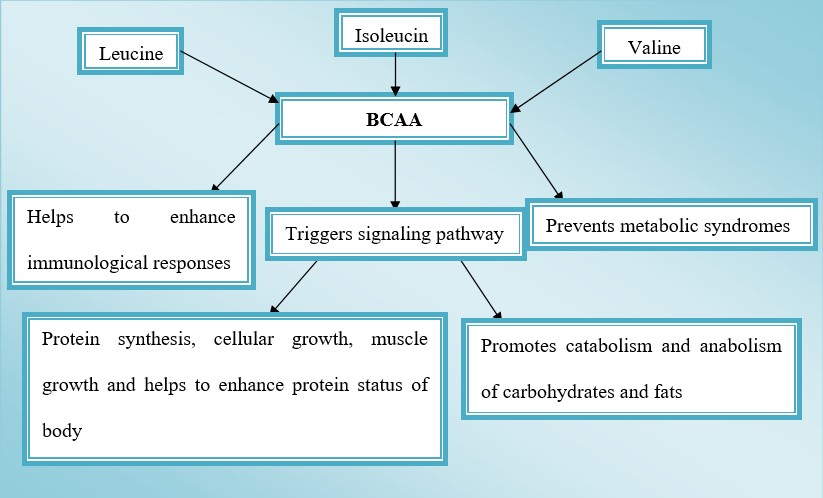Branched chain amino acid (BCAA) is one of the most important amino acids of body, which contains aliphatic side chain with branch. Basically, three types of amino acids are considered as branched chain amino acid, which are- leucine, isoleucine and valine, respectively. BCAA plays several vital roles in body such as it acts as signaling molecule that regulates the metabolism of carbohydrates, proteins and fats, helps in synthesizing nitrogenous compound, helps to prevent metabolic syndromes and promotes immunological health. Most significantly the anabolic property of BCAA is responsible for enhancing protein storage within body leads to improving nutritional status.
Below chart will depict an overview of the role of BCAA in body –

Sources
As mentioned above leucine, isoleucine and valine are termed as BCAA and these three amino acids are also known as essential amino acids hence they should be consumed through diet or supplements regularly to prevent their deficiencies as human body cannot synthesize them.
Foods rich in BCAA are listed below –
- Milk
- Whey protein
- Soybean
- Tofu
- Beans
- Chickpeas
- Lentils
- Nuts like almond, cashew
- Fish
- Egg
- Poultry
- Meat
Guidelines of consuming BCAA

- Adult female and adult male should consume 9 to 12g of BCAA daily to fulfill its requirement
- BCAA supplements should not require if a protein rich diet is consumed
- It is better to consume BCAA before work out to fuel the body. It can be also consumed after workout to repair muscle damages and prevent muscle weakness
Health benefits
Role on muscle and endurance
- BCAA helps in muscle protein synthesis and enhances muscle growth. It also helps to increase muscle mass which stimulates strength of the muscle
- BCAA helps to prevent muscle damage by inhibiting the secretion of creatine kinase (an enzyme that indicates muscle damage) and hence helps to spare the muscle from soreness
- It also helps to prevent the breakdown of protein during exercise
- Exhaustion of muscle has occurred after strenuous exercise due to muscle weakness and accumulation of lactate which affects muscle functioning. BCAA helps to prevent muscle fatigue and enhances endurance
- It also helps to increase lean muscle mass

Role on metabolism
- It helps in the metabolism of carbohydrates, proteins and fats by acting as signaling molecule which is essentially required for the regulation of the catabolic and anabolic pathway of glucose, lipids and proteins
- Protein kinase B, phosphoinositide 3-kinase are the signaling pathway through which BCAA helps in protein synthesis, lipid synthesis, carbohydrate metabolism, cellular proliferation and cellular growth

Role on preventing diseases
- BCAA helps to prevent diabetes mellitus (type 2). It has seen that isoleucine and leucine help to increase the secretion of insulin from pancreas which helps to transport glucose from blood vessels to muscle and liver where the glucose is stored as glycogen. As a result, glucose concentration is reduced in blood. BCAA also interferes with glycogenesis and glycolysis which is considered as another important factor of blood sugar regulation
- As BCAA is considered as essential amino acids. So, proper consumption of this is related with reducing the risk of developing various deficiency disorders and their harmful consequences
- Consumption of BCAA helps to prevent the generation of negative nitrogen balance within body hence inhibits unnecessary weight reduction and wasting
- It also helps to prevent protein energy malnutrition
- It has an important role on suppressing the growth of malignant cells in body and helps to reduce the susceptibility of developing cancers
Role on immunity
- It has seen that BCAA is well utilized by immune cells and it also helps to improve their functions which is associated with protecting the body from pathogenic invaders
- Lymphocytes require BCAA for synthesizing DNA, RNA and protein which are related with producing new effector molecules that helps to prevent infections

Role on promoting intestinal health
- Intestine is one of the most important part of the body that helps in digestion and absorption of nutrients. BCAA stimulates the growth of intestinal epithelial cell and facilitates absorption of nutrients
- Proper maintaining of intestinal permeability is very important as it acts as first defense line of the body which allows selective transportation of substances across it. BCAA is related with maintaining the function of intestinal barrier which is coupled with preventing the transportation of toxic elements across it and hence helps to protect the body against various harmful pathogens and antigens
Role on hepatic health
- It helps to stimulate the growth of liver cell and improves liver function
- It is also involved in hepatocyte proliferation and helps to suppress the growth of malignant cells that reduces the severity of carcinoma
- It has seen that individual suffers from liver disease has a low level of BCAA in their body and adequate administration of BCAA helps to improve the condition
Mechanism of its action
BCAA is very important for regulating nutrition metabolism, energy homeostasis, muscle health, immunity and blood sugar level. It has seen that leucine enhances protein synthesis and helps to increase muscle mass. It also stimulates glycogenesis that helps to reduce blood glucose concentration. Basically, leucine is associated with enhancing anabolic action of protein and helps to increases body reserves that prevents breakdown of muscle mass and other related body depletion.

Isoleucine and valine promote energy production that prevents muscle fatigue after exercise. They are also helping to increase glycolysis that stimulate energy production and helps to maintain blood sugar level.
Uses
- It is widely used by athletes as health drink, as it helps to restore protein in muscle that leads to enhancing the muscle mass and reduces the incidence of muscle loss and muscle weakness occurred after strenuous exercise
- It is also used to prepare several supplementary foods of great nutritional significance
- It can be used as an effective drink for successful weight management
- It can be used as therapeutic agent. It is associated with preventing the harmful consequences of liver, kidney and gastrointestinal disorders
- It can be utilized as a natural stimulator of insulin that enhances insulin secretion from pancreas and helps to control blood sugar concentration
- It can be used as a source of antioxidant for preventing oxidative damages of body and can also be used for reducing the risk of developing cancers
Risk factors
- Dietary consumption of BCAA is safe and does not show any side effects but excessive consumption of BCAA supplements is harmful for the body as it causes toxicity
- It has seen that excessive BCAA level interferes with insulin response. It increases the insulin resistance and results in elevating blood sugar level hence it is considered as a risk factor for type 2 diabetes
- Individual who suffer from maple syrup urine disease should avoid BCAA as they cannot break it

Source:
Brestenský, M., Nitrayová, S., Patráš, P., Heger, J. and Nitray, J., 2019. Branched chain amino acids and their importance in nutrition. Journal of Microbiology, Biotechnology and Food Sciences, 2019, pp.197-202.
Fedewa, M.V., Spencer, S.O., Williams, T.D., Becker, Z.E. and Fuqua, C.A., 2019. Effect of branched-Chain Amino Acid Supplementation on Muscle Soreness following Exercise: A Meta-Analysis. International Journal for Vitamin and Nutrition Research.
Gannon, N.P., Schnuck, J.K. and Vaughan, R.A., 2018. BCAA metabolism and insulin sensitivity–Dysregulated by metabolic status?. Molecular nutrition & food research, 62(6), p.1700756.
Hamilton, D.L., Schoenfeld, B.J. and Tipton, K., 2017. BCAA supplements are just hype–here’sa better way to build muscles. The Conversation.
Hormoznejad, R., Javid, A.Z. and Mansoori, A., 2019. Effect of BCAA supplementation on central fatigue, energy metabolism substrate and muscle damage to the exercise: a systematic review with meta-analysis. Sport Sciences for Health, pp.1-15.
Nie, C., He, T., Zhang, W., Zhang, G. and Ma, X., 2018. Branched chain amino acids: beyond nutrition metabolism. International journal of molecular sciences, 19(4), p.954.
Park, J.G., Tak, W.Y., Park, S.Y., Kweon, Y.O., Chung, W.J., Jang, B.K., Bae, S.H., Lee, H.J., Jang, J.Y., Suk, K.T. and Oh, M.J., 2020. Effects of Branched-Chain Amino Acid (BCAA) Supplementation on the Progression of Advanced Liver Disease: A Korean Nationwide, Multicenter, Prospective, Observational, Cohort Study. Nutrients, 12(5), p.1429.
Tipton, K.D., 2017. Branched-chain amino acid supplementation to support muscle anabolism following exercise. Sports Sci. Exch, 28, pp.1-6.


